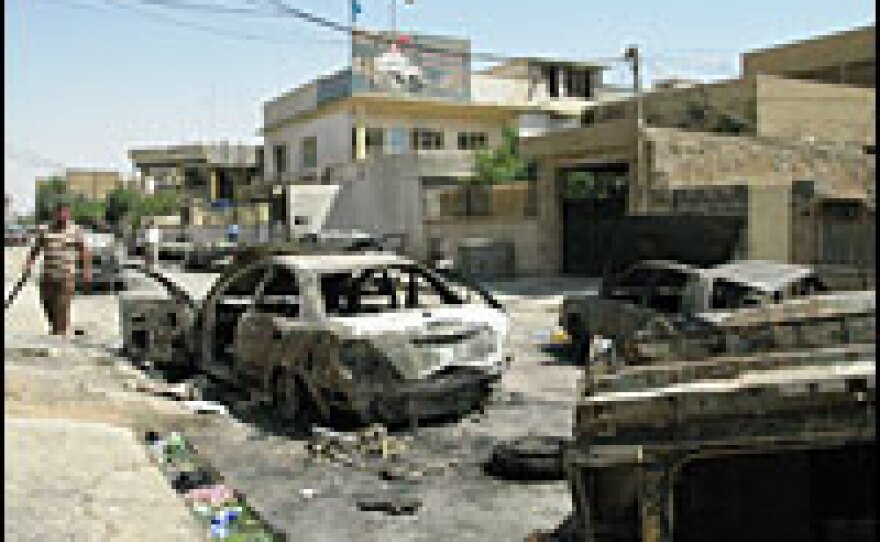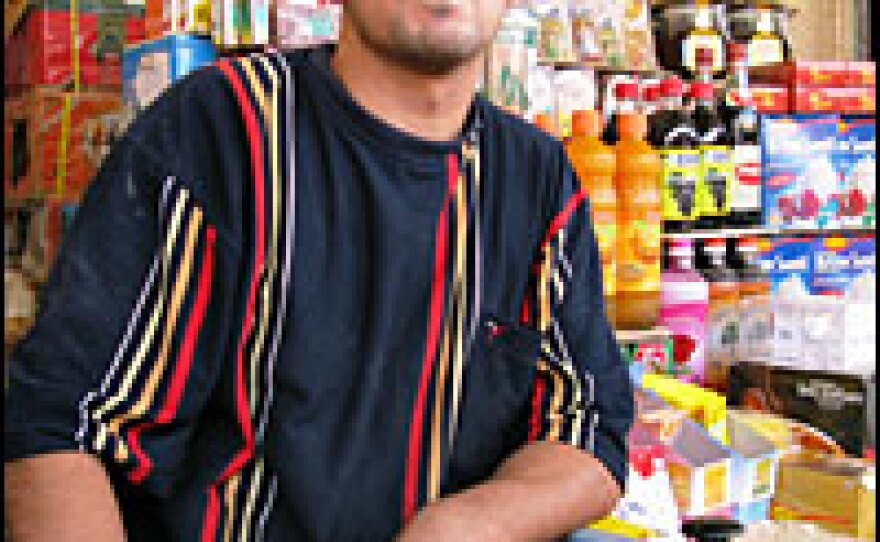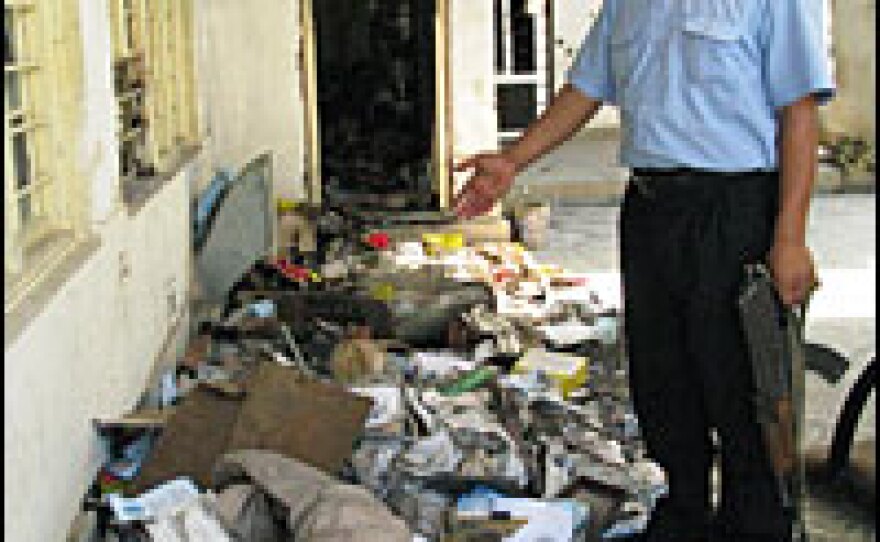


The U.S. military says violence is at a five-year low in Iraq, but the political battles in the country have rarely been worse.
The flashpoint for the growing strife is Kirkuk, an oil-rich city in northern Iraq that Kurds, Arabs and Turkmen each claim as their own. The tensions have stalled plans for provincial elections that were supposed to be held across Iraq later this year.
The tensions show no signs of abating, with some Iraqi leaders saying they would rather shed blood than compromise over Kirkuk's future. That leaves Kirkuk residents fearing their city could slip into sectarian war.
A Diverse Population
At a popular restaurant in central Kirkuk, the lunch crowd is as diverse as this historic city. Diners speak a variety of languages and dialects — such as Kurdish, Arabic and Turkmen — sometimes at the same table.
The atmosphere is relaxed, but patrons quickly grow tense when a visitor asks what they think about the growing political battle over what should happen with their city.
Most don't want to talk about it. One diner who agrees to talk is Mohammad Ali Papa, head of a group promoting ethnic cooperation in Kirkuk.
"We are confirming one thing: that Kirkuk is for all Kirkukis from all ethnicities," Papa says. "They should manage Kirkuk together equally, so no one could be marginalized."
That's never been the case in Kirkuk's troubled history, especially since vast oil reserves were discovered 80 years ago. There have been repeated efforts to displace various ethnicities from Kirkuk. During Saddam Hussein's rule, tens of thousands of Kurds and Turkmen were expelled from the city and replaced by Arabs from other places in Iraq.
Kurds Dominate — For Now
Today, it is the Kurds who wield the main power here, and they've been accused of displacing Turkmen and Arabs. Now, the city's minority Arab and Turkmen leaders say they no longer trust that their Kurdish counterparts will share power with them.
Mohammed Khalil al-Jabouri, a Sunni Arab member of Kirkuk's provincial council, says his Kurdish colleagues in late July voted to ask the semiautonomous region of Kurdistan to annex Kirkuk.
Kurdish backers of the proposal say they had no choice because Iraq's parliament isn't clearing the way for provincial elections to be held in Kirkuk or anywhere else.
They want Kirkuk residents to decide in a referendum once and for all what should happen to their city: whether it should continue to be linked to the central government in Baghdad, whether it should join Kurdistan to the north or whether it should be given a special status.
Instead, Iraqi lawmakers have sought to postpone the elections in Kirkuk while allowing them elsewhere in the country.
One bill passed by secret ballot last month would have delayed elections here and weakened Kurdish control over the city. It was quickly vetoed by Iraq's Kurdish president. It was supported by the country's Shiite vice president.
Holding Onto Kirkuk
Rizgar Ali Hamajan, the Kurdish chair of Kirkuk's provincial council, says the problem is that Iraq's central government does not want to part with Kirkuk and its oil, which it would have to do given the widely expected outcome of the referendum. That's not just because this city of 1.3 million people is majority Kurdish, he says, but because many residents prefer more distance from Baghdad.
Hamajan accuses lawmakers of playing an unconstitutional and dangerous game — one that could unravel the fragile security here and across Iraq.
He says he's willing to wait until lawmakers return from their recess next month, but he adds that if parliament, at that point, still refuses to clear the way for a referendum, his bloc will take matters into its own hands.
In Baghdad, many politicians bristle at such threat, including Saleh al-Mutlaq, who heads the second-largest Sunni Arab bloc in parliament.
"We want Kirkuk to be an Iraqi city, not a Kurdish city or an Arab city or a Turkmen city," Mutlaq says.
Mutlaq concedes that the Kurds can force the issue now, but he warns it will only be temporary and that, eventually, the Iraqi army will be strong enough to take Kirkuk back by force from the Kurds.
"Now Iraq is weak," Mutlaq says. "They can do whatever they want to do, but they cannot keep it."
Tension In The Streets
Already, the political tension has spilled onto Kirkuk's streets. Last month, a suicide bomber killed more than 20 people at a Kurdish rally protesting the parliament's actions. Scores of Kurds then tried storming a nearby Turkmen political office, where they broke windows and set cars ablaze, drawing gunfire from Turkmen security guards. One person was killed.
The office is still closed, with only burned-out cars, broken furniture and glass left behind.
Jamal Shan, who heads the Iraqi National Turkmen Party, says he worries such sectarian attacks will spread. He says Turkmen are thinking about forming their own militia to protect their interests.
"If that's not acceptable, then the central government should send its forces to Kirkuk to protect us," Shan says. "Or the Kurds should increase the number of Turkmen serving in Kirkuk's security forces. Or someone should bring in international troops, because we no longer trust the Kurds or the Americans who back them."
That sort of talk worries Kirkuk residents. Whether Kurds, Turkmen or Arabs, residents interviewed for this story say they don't want to end up living in a segregated city carved up by concrete barriers, like Baghdad.
Kirkuk residents say they thrive on living and working side by side, as they do at an outdoor market called "The Republic."
Ali Razhoughi Razi, a Kurd, counts a stack of Iraqi money he's earned from selling Chinese-made plugs and power strips here. He says he believes it is Iraq's politicians — not the residents of Kirkuk — who are stoking the ethnic tensions.
"I mean, Turkmen buy from me, Kurds buy from me, Christians — everybody buys from me," Razi says. "I've never seen anyone — an Arab or a Turkmen — say, 'No, you are a Kurd, I will not buy from you.' So that means we are living together as brothers."
Kirkuk Gov. Abdulrahman Mustafa Fatah, who is also Kurdish, shares that view. He says there have been plenty of attempts over the past five years to stir up trouble among the locals, but he believes the interethnic bonds are too strong here to be broken for long.
Copyright 2022 NPR. To see more, visit https://www.npr.org. 9(MDAzMjM2NDYzMDEyMzc1Njk5NjAxNzY3OQ001))







